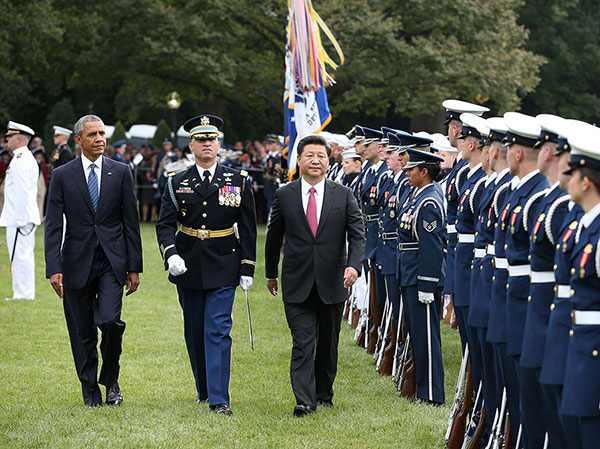When China and US join hands, the world benefits
Updated: 2015-09-28 08:05
(China Daily)
|
|||||||||||
 |
|
Chinese President Xi Jinping (R) is welcomed by US President Barack Obama (L) at the South Lawn of the White House in Washington DC, the United States, Sept 25, 2015. Xi arrived in Washington, the second stop of his first state visit to the United States, on Thursday after a busy two-and-a-half-day stay in West Coast hub Seattle. [Photo/Xinhua] |
It does not matter precisely how their ties are rhetorically framed - "new type of major-country relationship" or otherwise. China and the United States need a clear sense of direction as their relations approach a critical crossroad, and, as the latest talk about "frenemy-ship" indicates, could go either way.
So, it matters whether each side gets reassurance that it can count on the due respect of the other. It also matters whether President Xi Jinping's visit has been successful - to both Beijing and Washington, actually the world at large.
Judging from the lists of achievements Beijing and Washington have published, the visit was nothing but a success - a big one from Beijing's perspective.
As some have observed, Chinese media have sounded more upbeat about the visit, and rightfully so, for it offered a badly needed dose of optimism for the worrisome state of bilateral ties.
That Beijing has published a much longer and detailed - 49-item - "achievements check-list" than Washington's "fact sheet" reveals a subtle difference in perspectives. While Washington dwells on hard facts, Beijing cherishes everything conducive to stabilizing ties.
That the agreement on promoting what it terms as "new type of major-country relationship" tops China's list while being absent on that of the US, too, offers food for thought. With some in the US preoccupied with what they see as imminent threats, from the South China Sea to cyberspace, Beijing wants strategic consensus as much as, if not more than, pragmatic cooperation.
Business deals, like the purchase of 300 Boeing jetliners, is "ballast" for Sino-US ties. But we need more than such "ballast" to deepen strategical mutual trust. Beijing's message in the lengthy list is clear: Everything conducive to building confidence is an achievement worth celebrating. Such enthusiasm deserves equally enthusiastic resonance from the other side of the Pacific.
Xi's visit was about mutual assurance, and served that purpose well. That is good for both countries.
Citing Chinese villagers' rescue of US pilots during World War II and the two countries' collaboration in the recent fight against Ebola in western Africa, US President Barack Obama told his Chinese guests that the two countries not only need to cooperate, but also can continue cooperating. That is very correct.
Once their remarks on "managing and controlling divergences in constructive manners" are honored in practice, the potential of Sino-US partnership would be limitless. So would be the subsequent benefits.
Sino-US agreements on matters of broader concerns, climate change and development cooperation in particular, added a global dimension to the visit.
When China and the US join hands, the world benefits.
Related Stories
China, US sign new MoU on development 2015-09-28 04:37
US and Chinese Brands 2015-09-27 23:22
China, US agree to cooperate on fighting corruption 2015-09-27 19:16
Chinese president says US visit fruitful, sending positive signal for cooperation 2015-09-26 19:09
China-US climate commitments meaningful to the world: NDRC 2015-09-26 17:04
Today's Top News
China unveils 600 South-South Cooperation projects
Xi's DC visit hailed as success
China pledges $2 billion to support South-South cooperation
Saudi stampede death toll rises to 769: Health minister
Xi, Obama outline joint vision to combat global climate change
Xi will get a bigger welcome in UK
China to create national carbon-trading market
Xi, Obama take aim at cybertheft
Hot Topics
Lunar probe , China growth forecasts, Emission rules get tougher, China seen through 'colored lens', International board,
Editor's Picks

|

|

|

|

|

|






